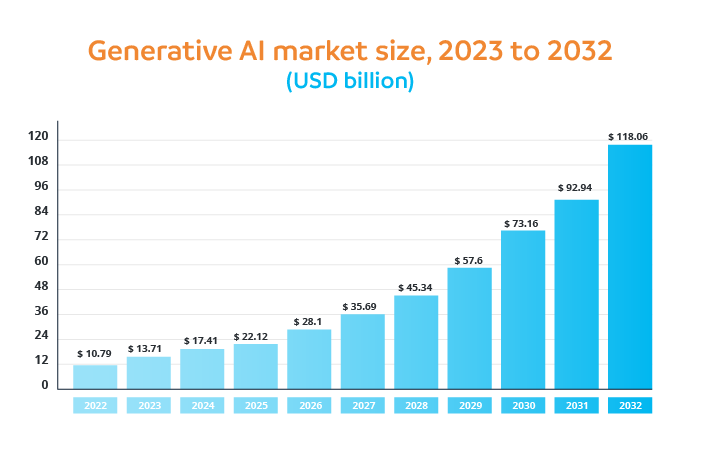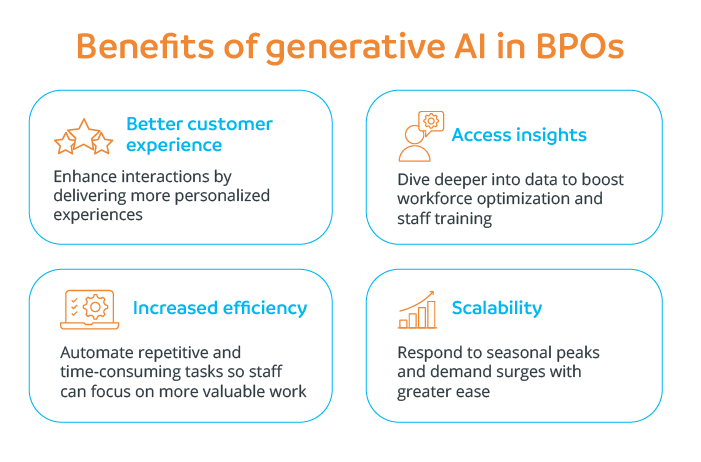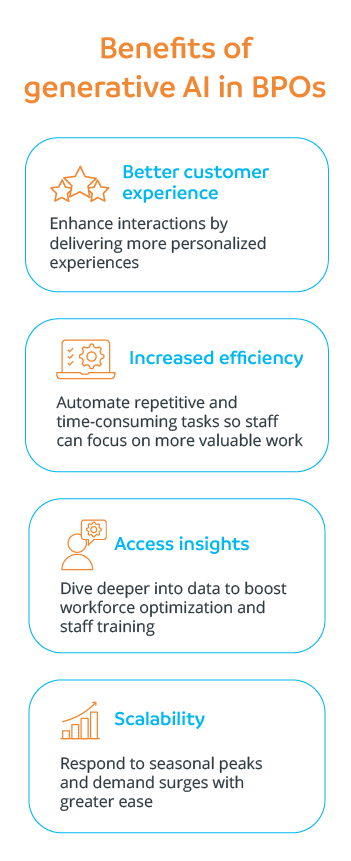The impact of generative AI on the BPO industry
Generative AI may be able to trace its origins to the 1960s1 but for the everyday man or woman, it was the past year that gave birth to one of the most remarkable technologies they have seen. From the moment ChatGPT exploded onto the public consciousness in late 2022, clocking up an incredible 1 million users in only five days2, people have been blown away by the artificial intelligence’s ability to generate text, images or other content based on the data it is trained on.

While early headlines were about students using ChatGPT to cheat3 and Hollywood recently felt the impact of strikes against generative AI4, countless industries are doing their best to understand how to make the most of a technology that is here to stay. This includes the global BPO sector, which has long prided itself on its willingness to embrace innovations that help their clients further increase efficiencies, reduce costs and boost customer experience.
With 2024 set to be another defining year in the evolution of generative AI, this guide is designed to provide readers with insights into how the technology is set to benefit BPO providers and their clients, the potential hurdles to be navigated and what the generative AI means for the future of the outsourcing sector.
What is AI in outsourcing?
Generative AI is a type of artificial intelligence technology that uses deep-learning models to produce various types of content including text, imagery, audio and synthetic. When incorporated into a BPO environment, it can enhance automation, streamline processes and enhance services for the betterment of offshore employees and the clients they serve.
 Source: Generative AI Market Size To Hit USD 118.06 Bn By 2032 (precedenceresearch.com)
Source: Generative AI Market Size To Hit USD 118.06 Bn By 2032 (precedenceresearch.com)
How is AI used in BPO industry?
Outsourcing providers pride themselves on going the extra mile for their clients and using generative AI to complement hard-working staff can provide several benefits.
- Customer experience: with so much focus on the need to create more tailored experiences for customers, generative AI tools can help BPOs raise the bar when it comes to delivering faster service and understanding their needs and preferences. By analyzing customer data and providing personalized offers and recommendations, the technology can improve customer satisfaction and increase loyalty rates.
- Automation: like all businesses, BPOs have a vested interest in working smarter, not harder and that is where generative AI comes to the fore. Many solutions and tools can automate routine and repetitive tasks that were previously performed by humans, freeing up staff to dedicate their energies to more complex and high-value jobs. The result? Increased efficiency, reduced costs and improved quality.
- Predictive analytics: data is king in the modern business environment and artificial intelligence can open up new possibilities by providing BPOs with the ability to tap into customer behavior insights and market trends. In doing so, outsourcing providers can make better-informed decisions and ultimately provide their clients with enhanced services.
- Scalability and flexibility: the BPO sector is an invaluable resource when onshore businesses need to scale their operations up or down due to changing demands. Generative AI solutions can play a role in improving that capacity. Be it a seasonal peak or surge in customer inquiries, outsourcing providers can use such tools to complement the traditional technology and hiring campaigns that have typically been used to deliver such flexibility.
Why is caution needed when using generative AI in BPOs?
While many BPO providers are exploring the potential for generative AI pilots, both they and their clients must have realistic expectations. Indeed, there is an argument that it has never been more important for them to consider whether the risks outweigh the rewards in rushing the adoption of certain generative AI tools.
Amid the hype surrounding ChatGPT and other solutions, outsourcing leaders have not been alone in thinking generative AI may be a one-way ticket to increased productivity and improved efficiencies. As an emerging technology, it has been repeatedly shown there is a risk of generative AI providing information that can be inconsistent and unpredictable and while that may be acceptable for low-risk tasks, it is a major concern when used in customer-facing situations.
For this reason, BPO providers must concentrate their generative AI capabilities on ‘agent assistance’, that world where the outcomes provided by the technology is validated by humans. Generative AI is changing the business landscape but the outsourcing sector is ultimately about people and until the technology can deliver 100% accuracy 100% of the time, it should be used to support the people who make BPOs the invaluable service they are.


Where can generative AI enhance BPOs?
When adopting generative AI, outsourcing providers should start by focusing on areas that will deliver quick wins for both them and their clients.
- Human resources: recruitment and onboarding are staples of the BPO sector and generative AI has immense potential to enhance the HR support role. Along with helping to identify quality talent and streamlining employee onboarding, the technology can provide research and analysis of candidate data to assist with retention and staff engagement strategies.
- Contact centers: the BPO sector has a proud history of providing the human agents onshore clients need to deliver affordable, around-the-clock customer service. Generative AI is increasingly allowing those agents to access relevant information rapidly and address their clients’ customer inquiries more efficiently. Along with reducing research time and streamlining interaction, this means human staff can spend more time on more complex issues.
- Content creation: BPO providers provide a range of services that require the crafting of relevant and contextual content, from marketing material and FAQs to customer-facing articles. Generative AI can develop first drafts of such content that can, in turn, be reviewed and leveraged by offshore staff. It is all about scaling content needs in a content-hungry world – but always with the presence of humans to ensure accuracy and quality.
- Workforce optimization: resource allocation is vital for the success of any organization, let alone one that is all about the most precious resource of all people – people. BPO operations can use generative AI to leverage historical data, customer patterns and external factors, ultimately leading to more precise forecasts and allocation of resources. This includes optimizing staff schedules to ensure those with the right skills are assigned to the right tasks at the right time.
Summary
The BPO sector is not alone in grappling with the emergence of generative AI and many hurdles need to be cleared before maximizing potential benefits. From implementation and data privacy to cost of technology, training and maintenance, individual players must navigate various challenges – not to forget the need for strict oversight by human staff. That said, the scope for offshore providers to improve their operations using generative AI means it is an incredibly exciting time for both them and the clients they serve.
Amid recruitment challenges and economic pressures, it is easy to forget the many ‘proactive’ reasons for partnering with a quality offshore provider. Discover why more businesses are turning to outsourcing in their bid for sustainable growth.
Reference:
[1] What is Generative AI? Everything You Need to Know (techtarget.com)
[2] ChatGPT hit 1 million users in 5 days: Here’s how long it took others to reach that milestone | Technology News - The Indian Express
[3] My students are using AI to cheat. Here’s why it’s a teachable moment | Siva Vaidhyanathan | The Guardian
[4] Computer-written scripts and deepfake actors: what’s at the heart of the Hollywood strikes against generative AI (theconversation.com)
Popular posts
Sign up for the offshoring eCourse
12 in-depth and educational modules delivered via email – for free
Related Posts
Managed services vs traditional outsourcing: understanding the difference
It has long been said that an organization’s people are its greatest asset but many business leaders will tell you that staffing issues are one of..
The power of extension: how offshore teams enhance local workforce dynamics
Picture this: a local team is grappling with tight deadlines or perhaps they lack the specialist expertise needed to push a critical project over the..
Innovate or stagnate: how offshoring empowers organizations to embrace digital change
There is a lot to like about digital innovation. Technologies such as artificial intelligence (AI), robotic process automation (RPA) and the Internet..
